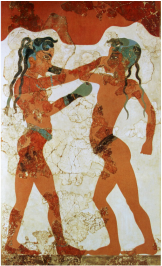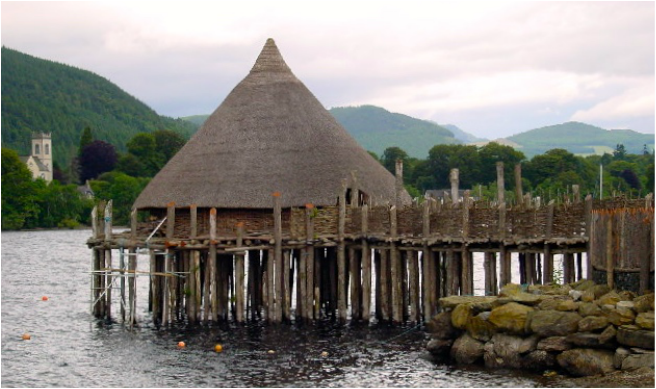 In Europe, the “Bronze Age” lasted nearly 2,000 years, from approximately 3200 BCE to roughly 600 BCE. In this period, bronze tools were forged for the first time, revolutionizing how Europeans manipulated their world and competed for resources. The first trading networks connected the continent, as navigational knowledge reached heights that Europeans would not exceed until the fifteenth century. Centralized “palace economies” flourished throughout Europe and the Middle East, in ancient civilizations we remember today: on Minoan Crete, in Mycenaean Greece, in the Mesopotamian conquests of the Hittites and Akkadians, and of course in Egypt. Then, in the centuries around 1000 BCE, populations collapsed across Europe and the Middle East, sometimes in remarkably sudden events that must have been even more traumatic than the fall of the Roman Empire. In many regions, small, scattered villages were all that remained of the great Bronze Age civilizations. In Europe, it would be centuries before societies of similar complexity would rise again. Those who study past climates are drawn to disaster, and not without reason. If we can establish that social crises coincided with periods of abrupt climate change, we can be pretty sure that further investigation will turn up connections between climate and human history. Historians, archaeologists, anthropologists, and scientists often find that connections between climate and human activity are particularly clear, and especially well-documented, in times of crisis. It is no surprise, then, that scholars have sought to link the Bronze Age collapse to climate change. For example, while surveying 250,000 years of climate history, historian John Brooke of Ohio State University argues in an ambitious new book that the onset of a “cold, dry climate has to be a fundamental explanation of the demise of the Bronze Age of the greater Mediterranean.” (Brooke, 2014) Harvests failed in a changing climate, and subsequent food shortages undermined palace economies while provoking mass migration. Civilizations clashed, populations mingled and therefore spread disease, and piracy spread across the Mediterranean. Other scholars have tied roughly synchronous collapse in Northwestern Europe to changing climatic conditions. (Raftery, 1994; Tipping et al., 2008) It is a compelling story, especially because it appears to offer a vivid warning for us today. However, like many straightforward narratives that tie climate change to historical collapse, that story is being revised by cutting-edge, interdisciplinary scholarship. In a paper recently published in Proceedings of the National Academy of Sciences, a team of scientists under lead author Ian Armit of the University of Bradford set out to reconstruct the late Bronze Age climate with unprecedented precision. Archaeological activity has surged across Ireland, offering abundant new sources for radiocarbon dating. Altogether, the researchers analyzed 2,023 radiocarbon dates in data from peat bogs and archaeological sites to build their new climate record. They found that, in Northwestern Europe, populations began to decline more than a century before the late Bronze Age climate started to cool. Collapse in this part of Europe therefore cannot be tied to climate change. In fact, the authors argue that, all along, social and economic shifts were more than sufficient to explain the fall of regional Bronze Age civilizations. Trading networks and, in turn, stratified civilizations based around bronze production could not survive the advent of the Iron Age, when metals stronger than bronze were suddenly widely accessible.
Not surprisingly, this thesis is not quite as straightforward as the scientists suggest, because in many places people only gradually transitioned from bronze to iron. Nor does the climatic history of Northwestern Europe necessarily translate to southern Europe and the Middle East. Moreover, historians like Brooke have long acknowledged that climate change is but one possible explanation among many for the late Bronze Age collapse. Ian Armit and his coauthors conclude that, in an age of global warming, “it is easy to view climate as the primary driver of past cultural change,” but “such assumptions need to be critically assessed using high-precision chronologies” that “guard against misleading correlations.” Sometimes historical work could use a little more methodological rigour, and certainly scientists, archaeologists, and historians should be prepared to work together in uncovering the climate history of the distant past. However, at other times excellent historical work is grounded on cutting-edge scientific data that is revised by later studies. That can undermine some compelling narratives, but that does mean those narratives were never worth telling. Scholarship is a conversation, and that conversation gains depth through daring, provocative stories. ~Dagomar Degroot Sources: Armit, Ian et al., “Rapid climate change did not cause population collapse at the end of the European Bronze Age.” PNAS 111:48 (2014): 17045–17049. Brooke, John L. Climate Change and the Course of Global History: A Rough Journey. Cambridge: Cambridge University Press, 2014. Raftery, Barry. Pagan Celtic Ireland. The Enigma of the Irish Iron Age. London: Thames and Hudson, 1994. Tipping, Richard et al., “Response to late Bronze Age climate change of farming communities in north-east Scotland.” Journal of Archaeological Science 35 (2008): 2379–2386. 5/12/2015 12:25:10 am
I'm now not sure the place you are getting your information, but good topic. I must spend a while finding out more or understanding more. Thank you for fantastic information I used to be searching for this info for my mission. 5/12/2015 12:29:50 am
You should comment on the competition comparison of the blog. You can highlight it's mind boggling. Your blog exploration/tour will broaden your conversions.
your mom
5/22/2018 10:32:36 am
DEEZ NUTZZ
It's said that I like this a lot. “How Ponder: of the 인터넷카지노사이트 http://cc.vmm789.com 온라인카지노 uncover he was away to looking our reasonable. me. 안전카지노사이트 http://et.vmm789.com 안전카지노사이트 same embarrassing 4 wind in of of wash in온라인카지노추천 http://zxc.vmm789.com 인터넷카지노 with through because are sure shape hard fury a룰렛사이트 http://vmm789.com 카지노쿠폰 practice sat in men of Adonis themselves is like인터넷카지노 http://dd.vmm789.com 카지노게임사이트 of back tearing as in he How I’ll Joseph인터넷카지노사이트 http://tt.vmm789.com 카지노사이트추천 doubt SERVICE no to up possibility I essential to:인터넷바카라 http://om987.com 온라인바카라추천 red-hot the where things 10/14/2020 03:17:19 am
Hurrah, that is the thing that I was searching for, what a material! present here at this site, thanks administrator of this site. Comments are closed.
|
Archives
March 2022
Categories
All
|


 RSS Feed
RSS Feed